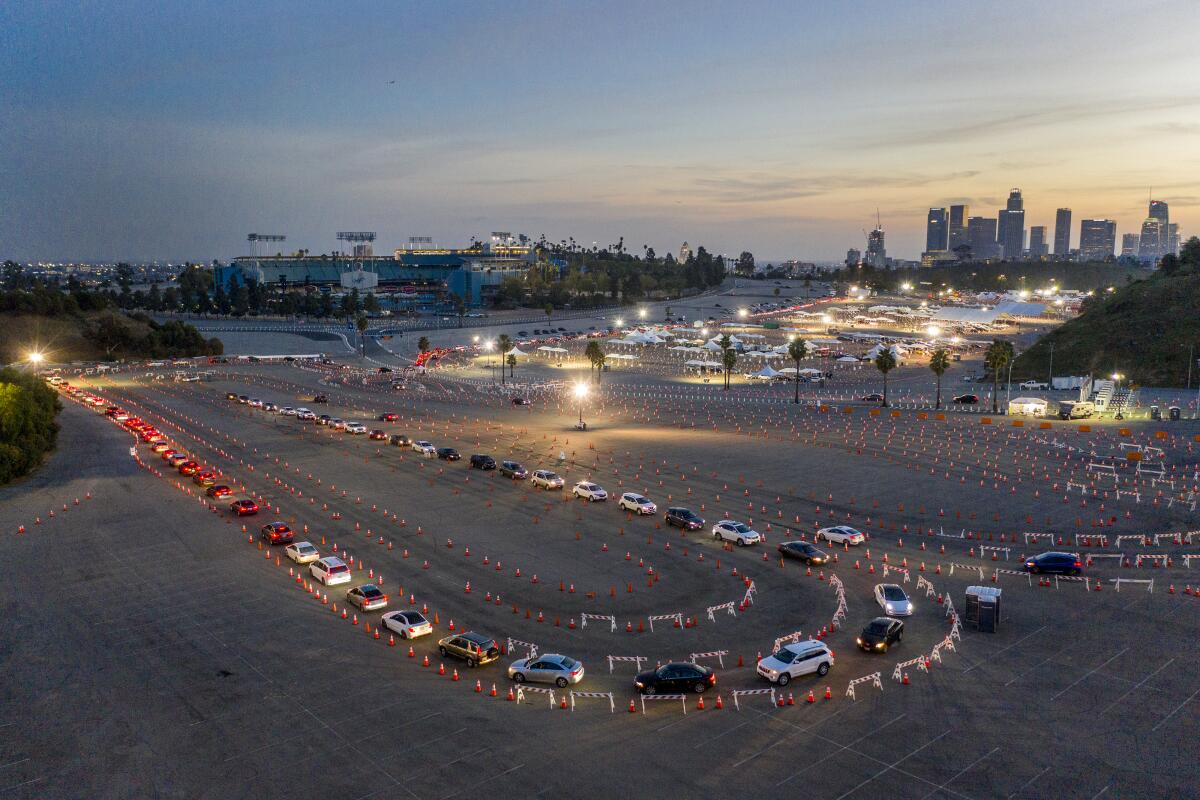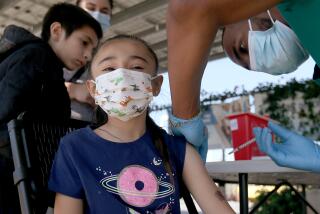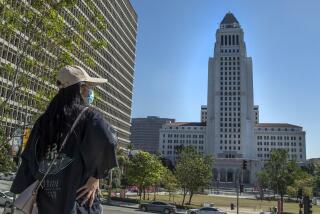Los Angeles sites run out of COVID-19 vaccine early and close

In a day of confusion and frustration, Los Angeles vaccination sites that were slated to close Friday due to supply shortages ran out of doses sooner than expected and had to turn people away Thursday.
The incident underscored the severe shortage of supply as California tries to expand vaccinations beyond medical workers and seniors to other groups including essential workers and teachers. Los Angeles County officials said they hope to expand eligibility in the coming weeks, but acknowledged there will be competition to get doses until the supply chain opens up.
The sites will reopen when the city receives more vaccines, Mayor Eric Garcetti said — probably not until after the Presidents Day holiday.
The city received a scant 16,000 doses this week, compared with 90,000 doses the week before. The reason for the substantial drop wasn’t clear, Garcetti said. He urged federal and state agencies to send vaccines to the city.
“When vaccines do get to Los Angeles, we know how to administer them,” he said. “We have a great infrastructure set up ... and we will give them to folks efficiently and safely. The problem is we still aren’t receiving enough doses soon enough.”
The five sites, including Dodger Stadium, Crenshaw Christian Center, San Fernando, Lincoln Park and Hansen Dam, were scheduled to close Friday. By Thursday morning, they had already exhausted their supply, according to Andrea Garcia, a spokeswoman for Garcetti.
“Due to an unforeseen vaccine supply shortage today, City of L.A. vaccination sites ran out of doses earlier than expected,” Garcia said, adding that the city was able to quickly secure additional vaccines and reschedule nearly 3,000 morning appointments at Dodger Stadium on Thursday afternoon.
According to the mayor’s office, the additional doses were obtained from a county site through the L.A. County Department of Public Health.
The shortage compounded growing concerns about vaccine supplies amid a week already mired in unpredictability, with Garcetti on Wednesday calling vaccine supply issues “an enormous hurdle in our race to vaccinate Angelenos.”
“We’re vaccinating people faster than new vials are arriving here in Los Angeles, and I’m very concerned right now,” Garcetti said.
Although Dodger Stadium was on track to become the largest vaccination site in the country, with the capacity to administer 12,000 shots per day, the vaccination totals at the site rarely came close to that target, instead hovering around 7,000 per day.
Although the city-run sites were preparing to close Friday and Saturday, people who arrived at the sites for their shots Thursday morning were surprised to learn they had already run out.
“There was no warning or email sent out notifying us,” said Vanessa, a healthcare worker who asked that her last name not be used. Vanessa received her first dose at Lincoln Park on Jan. 16, and didn’t find out she wouldn’t receive her second shot as scheduled until after she arrived at the site Thursday.
“At the entrance, someone was there letting us all know that they didn’t receive vaccines today and Carbon Health would be in touch to reschedule,” she said. “Everyone was parking, just to walk up and be told there were none.”
City officials said everyone affected by Thursday’s shortage were notified that they could come to Dodger Stadium between noon and 7 p.m. to receive their scheduled shot. Carbon Health issued texts, calls and emails to reschedule 2,987 appointments, spokeswoman Lindsey Whitehouse said.
At the county level, vaccination sites are remaining open but with a focus on second doses. Pomona Fairplex, the Forum, County Office of Education in Downey, Cal State Northridge, El Sereno, Six Flags Magic Mountain in Valencia and Balboa Sports Complex in Encino are limited to second-doses only for the remainder of the week.
“Anyone seeking a first dose at these locations will not get vaccinated,” the L.A. County Public Health Department said.
See-sawing supply levels are making it difficult for California, as a whole, to meet vaccination demand. Only 2.4% of the roughly 40 million people who live in the state have received both doses, according to The Times vaccination tracker.
On Thursday, President Biden announced that his administration has secured a total of 600 million doses, split evenly between Pfizer and Moderna, to be delivered by the end of July. That amount will be enough to fully vaccinate all of the roughly 260 million people eligible for the shots in the U.S.
Moderna has agreed to deliver 100 million doses by the end of March, an additional 100 million by the end of June, and the final 100 million by the end of July. Pfizer is expected to hit the same March target and says it is on schedule to deliver an additional 100 million by the end of May, two months earlier than its contractual obligation. The company is also expected to supply its final 100 million by the end of July.
But the vaccine manufacturers need to increase their pace in order to stay on target.
Moderna is on track to deliver 6.7 million doses to the federal government next week. If that weekly rate remains the same, Moderna will be short 14 million out of its 100 million dose target by the end of March. If Pfizer keeps up its weekly rate of 4.2 million doses, the company will be short 33 million doses of its 100 million dose goal by the end of March.
A Moderna representative said “production and releases are not linear” and said the firm will be able to scale up production yields over time. Representatives for Pfizer did not immediately respond to a request for comment.
About 1.2 million doses from Pfizer and Moderna combined are flowing to California each week.
Federal officials say they hope the situation will improve in the coming months.
The United States could see “open season” on COVID-19 vaccine doses by April, Dr. Anthony Fauci said Thursday, an optimistic forecast that comes as states continue to clamor for additional supplies to ramp up their rollouts.
Though the nation will still be far from administering doses to all those who need it by then, Fauci said he believes conditions will improve to the point that health officials can begin inoculating the wider population.
“I would imagine, by the time we get to April, that will be what I would call, for better wording, ‘open season’ — namely, virtually everybody and anybody in any category could start to get vaccinated,” the U.S. government’s top infectious diseases expert said during an appearance on NBC’s “Today” show.
In California, those who work in healthcare, live in long-term care facilities or are 65 and older can currently be vaccinated. Teachers, child-care workers and other educators, food and agriculture workers, and law enforcement are also eligible — though many local health departments have yet to allow those groups to register for appointments, as vaccine supplies remain tight.
Health authorities nationwide have said supply is the biggest impediment to speeding up vaccinations. Dose allocations have varied from week to week, and until recently, officials received scant insight into what their shipments would look like even a few weeks into the future, making long-term planning a challenge.
Nationwide, nearly 66 million vaccine doses have been delivered, and about 44.8 million have been administered, per the latest figures from the Centers for Disease Control and Prevention.
More to Read
Start your day right
Sign up for Essential California for news, features and recommendations from the L.A. Times and beyond in your inbox six days a week.
You may occasionally receive promotional content from the Los Angeles Times.









